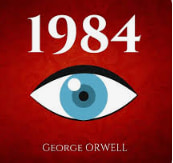Contents
It must be admitted that there are some books that freeze your blood while reading, hit you in the stomach like a punch, but when they are finished, they make you see the world in a completely different way. We are calling out to those who wonder, “I wonder if it is that much exaggerated?” Here is “the 1984 novel“, written by George Orwell, is exactly such a work. Since it was written in 1949, it is the first thing that comes to mind when it comes to dystopia, the most talked about, the most debated, and unfortunately, a masterpiece that has never lost its relevance.
At the center of the book is Winston Smith, who lives under the constant surveillance of the Party and whose freedom of thought has been taken away from him. Winston is in a silent rebellion against the artificiality of the world he lives in. In this universe where facts are manipulated and history is rewritten, even an individual’s effort to reach the truth is considered a crime. 1984 not only shows an individual’s conflict with the system, but also strikingly shows how a society gradually gives up its freedoms.
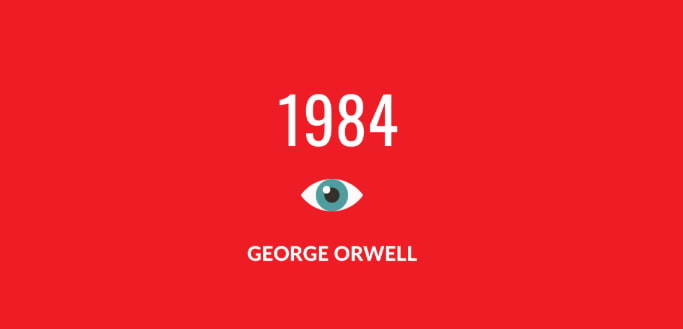
Orwell, who is also the author of Animal Farm, is remembered with iconic concepts such as “Big Brother is watching you.” The surveillance society supported by technology, the suppression of the individual’s mental independence and the culture of fear are the most striking themes of the book. 1984 is not only a novel but also a political manifesto, inviting its readers to think and question. In this respect, the book has a social and philosophical depth beyond its literary power.
Life in Oceania in 1984: A Nightmare World
In his book 1984, George Orwell takes us to a future date, to a superstate called Oceania where a totalitarian regime rules. Although the title of the book “1984” indicates a distant future for the time it was written, the world it describes is actually the portrait of a timeless nightmare. Oceania is constantly at war with the other two superstates, Eurasia or Eastasia – whichever enemy the Party points to, of course. Cities are in ruins, food is rationed, people live in misery and are under the surveillance of the Party and Big Brother at all times and everywhere. A gray and stifling atmosphere prevails everywhere, where not even a crumb of individuality remains and hope is a luxury.
The sole and absolute power that governs Oceania is the Party. The Party’s ideology is “Ingsoc“, short for “English Socialism“. At the head of the Party is a mysterious leader figure called “Big Brother” whose face no one has ever seen, whose existence is unknown, but whose posters hang on every wall. The slogan “Big Brother is Watching You” is the basic motto of life in Oceania. The Party controls every aspect of its members’ lives, interfering in everything from what they eat to what they wear, from what they think to who they associate with. The aim is absolute loyalty to the Party and unwavering love for Big Brother.
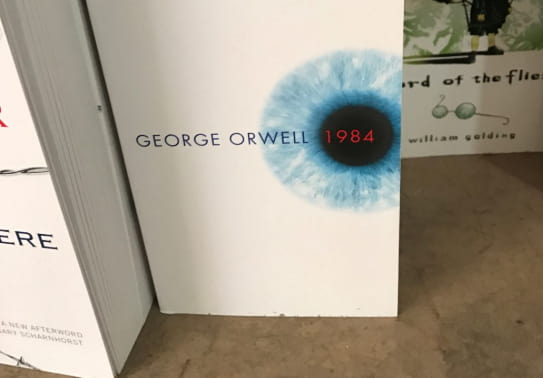
The Party has four main ministries to maintain this absolute control, each with a function that belies its name – another product of Orwell’s genius.
- The Ministry of Truth (Minitrue) constantly rewrites history to suit the Party’s interests, manipulating the news and all kinds of information.
- The Ministry of Love (Miniluv) tortures those who oppose the Party, interrogates thought criminals and ensures loyalty.
- The Ministry of Peace (Minipax) manages and perpetuates perpetual war.
- The Ministry of Plenty (Miniplenty) manages famine and is inadequate to meet the people’s basic needs. Even these ironic names are an indication of how the Party has turned reality upside down.
New Discourse and Telescreens
There is no such thing as privacy in Oceania. “Telescreens” in every home and public space both broadcast Party propaganda and watch and listen to people 24/7. Even the slightest suspicious movement, a false facial expression, or a word spoken in one’s sleep can attract the attention of the Thought Police. Children are encouraged to report their own parents to the Party. People live in constant fear and paranoia, unable to trust anyone. Because the greatest crime is “thought crime,” and the penalty for this is to be vaporized, that is, erased from all records and destroyed.
One of the Party’s control mechanisms is language. An artificial language called “Newspeak” is developed. The purpose of this language is to restrict the range of thought by narrowing the vocabulary. If a word like “freedom” is removed from the language, the concept of freedom itself will eventually disappear. Another important concept is the ability to “doublethink.” This is the ability to accept two contradictory ideas at the same time and believe in both. For example, believing in the slogan “War is Peace” and knowing the cruelty of war. These psychological manipulations aim to completely destroy the individual’s perception of reality.
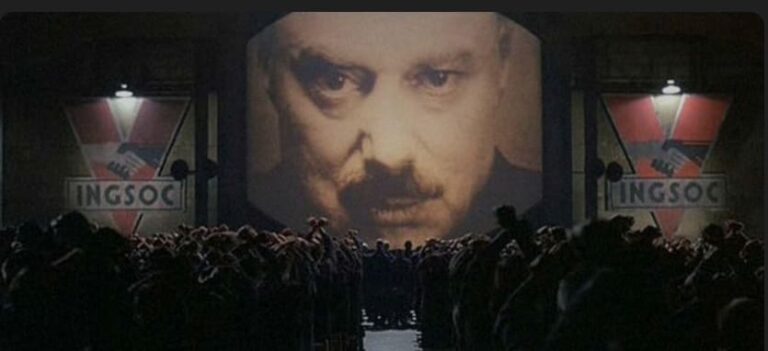
Unforgettable Characters and Winston Smith
- Our main character who guides us through the gloomy world of “1984” is Winston Smith. He is an ordinary civil servant working in the Ministry of Truth, tasked with rewriting the past in accordance with the Party’s directives. However, inside Winston burns a fire of rebellion against the lies and oppression imposed by the system. While everyone around him unquestioningly believes in the Party’s propaganda, he remembers the past, longs for the truth and feels hatred for this totalitarian order. Rather than being a revolutionary hero, Winston is a very “real” character who tries to remain human and struggles with his fears and doubts.
- Winston’s rebellion begins with small steps. He begins to keep a diary in secret; this is a great risk that means the death penalty if he is caught by the “Thought Police“. He writes “Down with Big Brother!” in his diary. Later, he falls in love in a way forbidden by the Party. His secret love affair with Julia is both a personal rebellion and a journey to rediscover his human feelings. Winston believes in the myth of the “Brotherhood“, a secret resistance organization against the Party, and seeks ways to reach this organization. He desperately wants to believe that things can change.
- Julia is a young and rebellious woman who enters Winston’s life. She also hates the Party, but her rebellion is different from Winston’s. Julia is after personal freedoms rather than an ideological struggle. She tries to obtain the small pleasures forbidden by the Party (such as real coffee, chocolate, make-up) and bends the rules for her own benefit. While Winston thinks about the past and the future, Julia focuses on living in the moment. Despite these differences, they both seek refuge in each other under the oppression of the totalitarian regime, and those brief moments of freedom they share constitute the most touching sections of the 1984 novel.
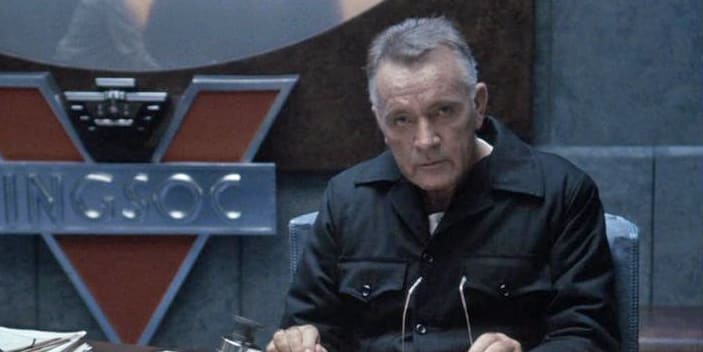
Mr. Charrington, O’Brien and Others
One of the most mysterious and frightening characters in the 1984 novel is O’Brien. He is a powerful member of the Inner Party, and Winston initially believes that he thinks like him and is part of the Brotherhood. Winston trusts O’Brien and opens up to him. However, O’Brien is actually one of the most ruthless interrogators of the Thought Police and personally manages Winston’s “treatment” process. O’Brien tries to break Winston’s resistance not only with physical torture but also with mental manipulation. He is an intelligent and frightening figure who represents the philosophy and power of the Party.
There are also remarkable side characters in the book other than Winston, Julia, and O’Brien. For example, Mr. Charrington, the owner of the antique shop, initially seems to offer Winston a refuge from the past, but is actually an agent of the Thought Police. Syme, who prepared the New Speech dictionary and enjoys language, is eventually vaporized himself. His neighbor Parsons, who is blindly loyal to the Party, and his spy children are an example of how society has been brainwashed. Then there are the Proles, who are uneducated but numerous, and whom the Party does not care much about. Winston believes that if there is any hope, it comes from the Proles, because they still retain their human feelings.
1984 and What Are the Messages of the Book?
Reading 1984 as merely a dark future depiction or a gripping the novel 1984 would be unfair to Orwell’s genius and the depth of the book. This book tells much more than the period in which it was written; it is a timeless warning that reveals the nature of totalitarian regimes, the effects of power on human psychology, and the fragility of individual freedoms. With the many mechanisms and concepts he depicts in his book, Orwell also sheds frightening light on some developments in today’s world. For this reason, “1984” is a work that is rediscovered and given different meanings by each generation.
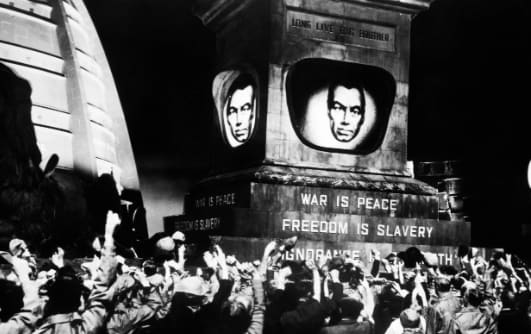
One of the strongest themes of the book is undoubtedly the dangers of totalitarianism and absolute power. The Party’s effort to control every aspect of life shows how a system that disregards the individual and only looks out for the Party’s interests can be established. Orwell strikingly explains that power corrupts, and absolute power corrupts absolutely. The existence of similar oppressive regimes in different geographies throughout history and today proves how valid this warning from “1984” is. It reveals how a society without free thought and opposition can turn into a nightmare.
The manipulation of truth and history is another important theme at the center of the 1984 novel. This is exactly what is done in the Ministry of Truth: The past is constantly rewritten to fit the Party’s current discourse. The slogan “Who controls the past controls the future; who controls the present controls the past” summarizes this mechanism. The phenomenon of “fake news” today, the potential of social media to control the flow of information, and in some cases, the different interpretations of historical events show how sharp Orwell’s foresight on this subject was. The importance of access to information and accurate information is even better understood after reading “1984”.
The Surveillance Society and Lessons for Today
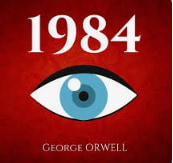
The theme of the surveillance society and the disappearance of private life is perhaps one of the most shocking parts for today’s readers. While the constant monitoring and listening via telescreens may have seemed like a science fiction element at the time, today we are in a much more complex surveillance network with our smartphones, security cameras, digital footprints on the internet and social media posts. Of course, there is no Thought Police like in Oceania (we hope!), but the collection, processing and how our data is used by whom inevitably brings to mind the surveillance nightmare in “1984”.
Orwell also perfectly demonstrates the effect of language on thought with the concept of “New Discourse“. The connection between the power of language and freedom of thought is one of the most important messages of the book. As words are narrowed down, thought narrows down as well. The importance of critical thinking, questioning and being able to express different ideas is understood once again after reading “1984”. Censorship, self-censorship and the imposition of a single type of thought are elements that threaten the mental freedom of the individual. “1984” reminds us how precious our freedoms, not just physical but also mental, are and how conscious we must be to protect them.
